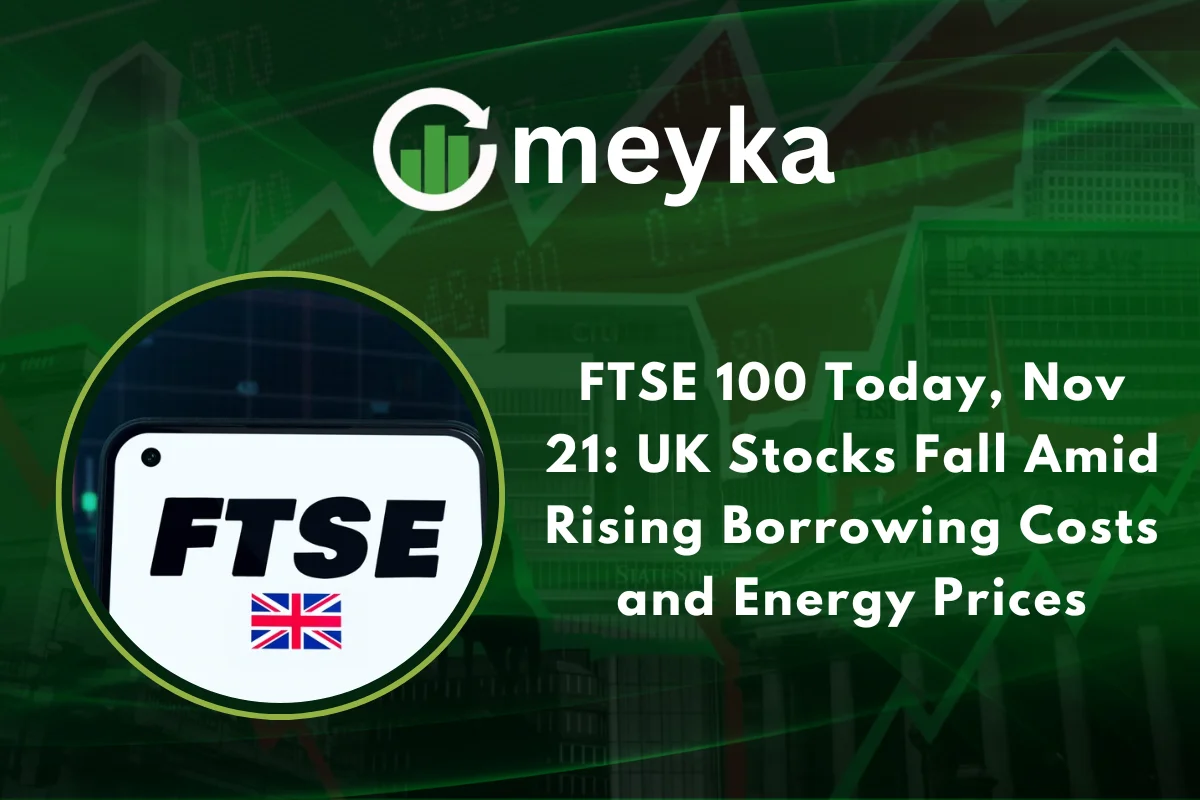FTSE 100 Today, Nov 21: UK Stocks Fall Amid Rising Borrowing Costs and Energy Prices
The FTSE 100 fell sharply today as rising borrowing costs and higher energy bills weighed on investor sentiment. In London, the large-cap UK stock index dropped over 1%, marking a one-month low for the benchmark.
Key Economic Pressures Driving the Decline
One major factor is the elevated level of UK borrowing. In October, the UK government borrowed £17.4 billion, surpassing forecasts and raising concerns about fiscal sustainability. This kind of borrowing boost usually triggers worries among investors about higher future taxes or tighter public spending – both of which can hurt economic growth and corporate earnings.
At the same time, energy costs are creeping up again. The regulator Ofgem announced a small increase of 0.2% in the energy price cap from January to March 2026, from about £1,755 per year to roughly £1,758 for a typical household. While the rise looks modest, the timing is bad: with inflation high and households already under pressure, any increase adds to the cost burden and lowers disposable income, which in turn affects retail-focused companies.
Retail data adds to the gloom. UK retail sales volumes fell by 1.1% in October, versus expectations of flat or mild growth. When consumers pull back, companies face weaker demand, and that hurts investor confidence.
In addition, fears about an overvalued technology and AI market bubble are returning. After major companies in the tech sector posted strong earnings, valuations are now being questioned, contributing to a broader sell-off in growth and tech-adjacent stocks.
What’s Happening in the Market
The FTSE 100 opened around 94xx points, down roughly 100 points or around 1% from the previous close. Some firms leading the decline include defence and technology-exposed companies such as Babcock International and tech-investment trusts. Energy stocks have also shown weakness, as global commodity shifts and domestic cost pressures combine.
Mid-cap and more domestically focused firms are under pressure too. Because of weaker spending by consumers and concerns over future costs, many investors have become cautious on UK growth-linked stocks.
Why These Pressures Matter for the FTSE 100
The FTSE 100 is heavily weighted towards large UK-listed companies, many of which derive significant revenue both domestically and internationally. When domestic economic headwinds rise, as seen with weak retail sales, rising household costs and government borrowing, investor appetite wanes.
High borrowing signals to the market that the government may need to either raise taxes or cut spending, both of which reduce growth prospects. Rising energy bills reduce consumer spending power, which hits consumer-sensitive stocks. Meanwhile, tech-related companies face valuation questions, especially when interest rates stay elevated and global growth becomes uncertain. All these combine to form a challenging backdrop for UK equities today.
What Investors Should Watch Next
- Upcoming Budget & Spending Plans
With public borrowing so high and retail weakness visible, the Chancellor’s upcoming Budget will be closely watched. Any signals of tax hikes, spending cuts, or lack of support for households could trigger further stock market weakness. - Energy and Commodity Developments
Any further increase in the energy price cap or breakout commodity prices would increase cost burdens for households and companies. This may weigh on sectors like retail, utilities and even industrials. - Tech & Growth Valuation Risk
Given renewed caution over the growth sector, especially in AI-adjacent firms, investors will monitor earnings and forward guidance closely. Even though the FTSE 100 has fewer pure tech firms compared to the US, the global sentiment shift affects all markets. The broader “AI stocks” theme is under scrutiny and could influence UK stocks via global linkages. - Interest Rate and Bond Market Signals
Higher borrowing often means more issuance of government debt, which can push up yields. Higher yields typically raise discount rates, reducing the present value of future earnings and hurting share prices, especially for growth companies. - Consumer and Retail Indicators
Since retail sales just fell 1.1% and consumer confidence remains weak, further data releases will be key. A continued drop in spending could confirm a slowdown in domestic demand, bad news for many UK stocks.
Bottom Line
The FTSE 100 is under pressure today, weighed by rising borrowing costs, energy-price concerns and a shift in investor mood away from growth-heavy sectors. The combination of weak retail data, elevated government borrowing and rising household cost burdens is a challenging mix.
UK stock investors should prepare for continued volatility and keep an eye on policy decisions, household spending trends and global tech-themes like AI that are now influencing sentiment across markets. While the spotlight is often on US markets or “stock market” themes like “AI stocks,” today’s move highlights that domestic economic fundamentals matter a great deal for UK equities too.
FAQs
The FTSE 100 is dropping because of higher-than-expected government borrowing, rising energy bills for households and renewed concerns over tech and growth valuations. The combination is weighing on investor confidence.
Energy stocks, technology-investment vehicles and consumer-oriented companies are among the most affected. Rising energy costs hit households and retail, while tech valuations face wider global pressure.
For UK investors, this means greater caution in market participation, especially for stocks sensitive to domestic demand and cost pressures. Globally, while the FTSE 100 is smaller than US indices, it is affected by similar themes: borrowing, interest rates, energy costs and tech valuation cycles. Investors doing stock research should note that UK equities are not immune to these global headwinds.
Disclaimer:
The content shared by Meyka AI PTY LTD is solely for research and informational purposes. Meyka is not a financial advisory service, and the information provided should not be considered investment or trading advice.






